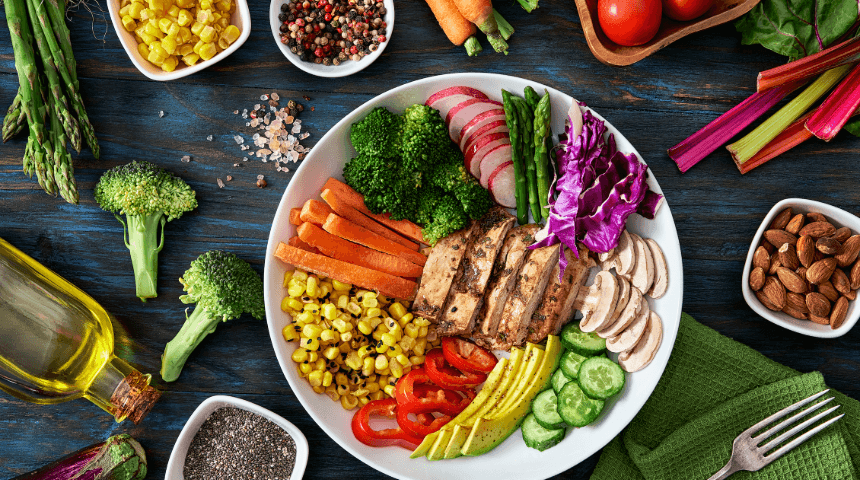Medication and talk therapy are effective ways to treat anxiety and depression. But you might be surprised to know that what you eat and drink also can affect your mood.
The Gut-Brain Connection
Your gut-brain axis is a two-way communication system between your gastrointestinal tract and your brain. This connection largely is influenced by the gut microbiota — the trillions of bacteria living in your intestines. These microbes produce neurotransmitters (like serotonin and GABA), regulate inflammation and influence the hypothalamic-pituitary-adrenal (HPA) axis, which controls stress responses.
When your gut microbiome is imbalanced due to poor diet, stress or illness, it can contribute to neuroinflammation, mood disorders and altered stress responses. This is why diet plays such a powerful role in your mental health.
Foods that May Help You
Omega-3 fatty acids — especially EPA (eicosapentaenoic acid) and DHA (docosahexaenoic acid) —support mental health by reducing inflammation, enhancing neurotransmitter function and stabilizing mood. Primarily found in fatty fish like salmon, sardines and mackerel, omega-3s have been shown to reduce symptoms of anxiety and depression.
Plant-based sources like flaxseeds, chia seeds and walnuts are plant-based omega-3s, but you need to consume more to achieve similar benefits. If you are following a plant-based diet, algae-based DHA/EPA supplements can be a more effective alternative to support mental well-being.
Vitamin D influences the production of neurotransmitters like serotonin. Low levels of vitamin D consistently have been linked to an increased risk of depression and anxiety. Despite its nickname as the “sunshine vitamin,” many people do not produce enough vitamin D naturally — especially those who live in northern climates, have limited sun exposure or have darker skin.
People with darker skin are at increased risk for vitamin D deficiency because higher levels of melanin reduce the skin’s ability to produce vitamin D from sunlight. Melanin acts as a natural sunscreen, blocking UVB rays that trigger vitamin D synthesis. This means individuals with melanin-rich skin may need more sun exposure or supplementation to maintain healthy levels.
Because vitamin D also helps reduce inflammation and supports immune function — both of which are linked to mental health — maintaining adequate levels through sunlight, fortified foods or supplements can be a valuable part of a holistic approach to managing anxiety and depression.
Zinc supports the activity of neurotransmitters and helps reduce oxidative stress and inflammation. Several studies have found that people with depression often have lower serum zinc levels, and taking a supplement may help improve symptoms, especially when combined with conventional treatments.
Low levels of folate, also known as vitamin B9, have been consistently observed in individuals with depression, and some studies suggest that folate deficiency may contribute to poor response to antidepressant medications. However, research findings are still mixed, and there can be complications. Good sources of B9 include leafy greens, broccoli, citrus, nuts and eggs.
If you choose to take supplements, consult your doctor first; there could be interactions with your medications or complications with your health conditions.
Foods To Avoid
If you consume a lot of sugar, it can cause blood sugar spikes and crashes and lead to irritability and fatigue. These fluctuations can worsen symptoms of anxiety and depression. Plus, diets high in added sugar disrupt the gut microbiota, which affects mood regulation.
The amount of caffeine and other stimulants in energy drinks can overstimulate your central nervous system, leading to an increased heart rate, jitteriness, restlessness and heightened anxiety. If you regularly consume energy drinks, you likely have trouble sleeping, which can significantly worsen anxiety and depression symptoms. Energy drinks also usually contain a lot of sugar.
Rich in omega-6 fatty acids and trans fats, fried foods may promote inflammation and oxidative stress, both of which are linked to mood disorders.
As a central nervous system depressant, alcohol initially produces a calming effect, but this is short-lived and often followed by increased anxiety, irritability and mood changes. Over time, alcohol disrupts your brain’s communication pathways, impairing the balance of neurotransmitters like serotonin and dopamine that regulate your mood and emotional stability.
Chronic alcohol use also is associated with increased inflammation and oxidative stress in the brain, both of which are linked to depression. Alcohol also can interfere with your sleep quality and make you feel tired and hopeless, creating a vicious cycle that makes it harder to recover from mental health conditions.
Make Lasting Changes in Your Diet
If you notice that certain foods make you feel sluggish, irritable or anxious, that’s a clue. Keeping a food and mood journal for two to three weeks can help you identify triggers and beneficial foods. Also, pay attention to sleep, digestion and energy levels — they’re all connected.
To change your diet to help anxiety and depression:
- Start small: Replace one processed snack a day with a whole food (e.g., fruit, nuts)
- Plan meals: Use a weekly meal planner to include mood-boosting foods
- Stay consistent: Aim for regular meals to stabilize blood sugar and mood
- Track your mood: Keep a food and mood journal to identify patterns
- Seek support: Work with a dietitian or therapist to create a sustainable plan
This content is not AI generated.
Choose to Stay in Touch
Sign up to receive the latest health news and trends, wellness & prevention tips, and much more from Orlando Health.
Sign Up for HealthBeat




